| |
 |
|
| |
 |
|
| |
Natural Emery
is a very hard rock type used to make abrasive
powder. It largely consists of the mineral
corundum (aluminum oxide), mixed with other
species such as the iron-bearing spinels
hercynite and magnetite, and also rutile
(titania). Industrial emery may contain a
variety of other minerals and synthetic
compounds such as magnesia, mullite, and silica.
However natural emery is mostly made of
Corundum. Translucent brown Corundum and Emery
are the most common forms of Corundum. These are
fairly common and when ground up, they are the
most favorable abrasives. The industrial term "emery"
describing corundum abrasives is derived from
the variety Emery which is mined for abrasive
use. Emery is used on surfaces to make them more
resistant. Emery grains can be used as hard
aggregates for anti-skid and non-wear flooring.
This type of flooring is most useful in areas
like warehouses with heavy forklift traffic,
workshops where oil is spilled and heavy objects
fall now and then, hospital ramps, reception
areas wtih heavy foot traffic, ship decks, and
treads of staircases and so on.
|
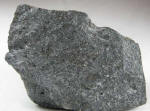 |
|
Natural Emery is
brownish-black or dark gray in color. It is the
hardest mineral
after
diamond,
making it the second hardest mineral with a mohs
hardness value of 9. Crushed or naturally
eroded emery (known as black sand) is used as an
abrasive — for example, on an emery board, as a traction
enhancer in asphalt and tarmac mixtures, or as used in
mechanical engineering as Emery cloth.
|
| |
|
 |
 |
Sandblasting/Abrasive Blasting: Natural
emery grain is the most suitable material for
sandblasting purposes. Emery grits are shot
across a surface at high speeds by pressurized
machines. The effect is similar to that of using
sandpaper, but provides a more even finish with
no problems at corners or crannies. Also unlike
other abrasive materials, emery grains have more
than one sharp edges on each particle. With this
characteristic, emery grains can be used more
than once (usually 5-8 times) in a
sandblasting operation. Please check the emery
picture above. Besides, with zero free-silica
content emery is non-hazardous for human health,
providing improved worker safety and
comfort.
|
|
| |
|
|
Anti-Skid
and Non-wear Flooring: Surfaces in
highways, shipyards and airports are under heavy
traffic. Emery is used on these surface to make
them more resistant. Either with oxychloride
formulation or with plain Portland cement emery
grains can be used as hard aggregates for anti
skid and non wear flooring. This type of
flooring is very useful in areas like warehouses
with heavy forklift traffic, workshops where oil
is spilled and heavy objects fall now and then,
hospital ramps, reception areas with heavy foot
traffic, ship decks, and treads of staircases
and so on. Superior abrasive action of the emery
grains imparts better grip and resist the wear
caused by heavy traffic. At toll booths on
highways, such surface will provide good braking
for the vehicles and add as a safety feature.
Traction
Enhancement: Emery is commonly used in
asphalt to enhance traction.
|
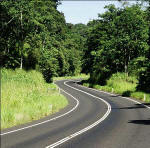 |
|
|
|
| |
|
|
| |
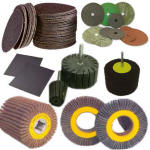 |
Coated
Abrasives: Emery is widely used in
manufacturing of coated abrasives like emery
cloth & emery paper. The typical self sharpening
action of the emery grains with needle shaped
grains and uniform grading make emery grains the
first choice for use in this application.
|
|
|
| |
|
|
| |
|
Flour Mill
Stones: Emery grains are mixed with the
magnesium oxide and magnesium chloride slurry
and allowed to set in a mould to form a solid
flour mill stone. Due to superior hardness,
emery grains help in better quality and durable
mill stones.
|
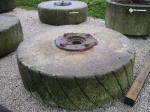 |
|
|
| |
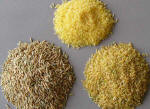 |
Rice
Polishing and Dehusking: Emery grains
along with magnesium oxide and magnesium
chloride are applied to the rice sheller cone ,
in rice mills for polishing rice with minimum
broken grains and faster output. The special
rice polishing grade emery grains form a
superior oxychloride bond and as a result the
stone lasts longer.
|
|
|
| |
|
|
| |
|
Deburring
and Descaling: Metal parts sheared and
cut , left with unfinished edges can be deburred
with emery in minutes , by putting the parts in
barrels and tumbling them along with coarse
sized emery grains. Similarly metal parts
with rusty surface and salt deposits can be
easily cleaned.
|
 |
| |
|
 |
Stainless
Steel Polishing: Emery grains applied on
a cloth buff is widely and popularly used for
polishing of metal articles like automobile
accessories (car bumpers, door handles) ,
dinnerware and table ware ( bowls, plates,
knives, spoons, forks etc.) stainless steel
balls for ball bearings and innumerable other
stainless steel articles. The smaller individual
crystal size, higher corundum content, and
perfect sizing makes emery the first and popular
choice for Stainless steel polishing. This
product can also be used in form of a emery
compound or paste.
|
|
|
| |
|
|
Fire Brick
Production: Emery grains are popular
among fire brick producers for their high
resistance and strength.
|
|
|
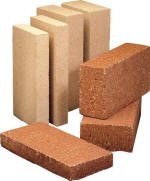 |
|
|
| |
|
|
| |
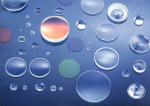 |
Optical Lens
Lapping: The finer grades ( 220 to 400 )
are used for lapping of optical lenses; either
in lieu of other abrasives or before and after
these abrasives. |
|
|
| |
|
|
| |
WHERE TO BUY
NATURAL EMERY GRAINS? |
|
| |
|
|
| |
 |
Address: 1690
Sokak No:5 D.301 Alaybey Karsiyaka Izmir
TURKEY |
|
Tel: +90 232
364 24 62 |
| Fax: +90 232
364 24 62 |
|
www.ltc.com.tr
|
|
info@ltc.com.tr |
|
|
| |
|
|
| |
|
|













